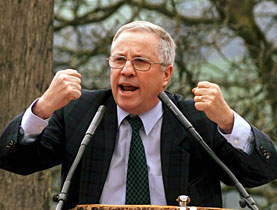“A country’s image abroad is paramount”

Government reform, public finance and relations with the European Union will top the agenda for Pascal Couchepin during his one-year term as Switzerland's president in 2008.
Couchepin, who replaced Foreign Minister Micheline Calmy-Rey on January 1, talked to swissinfo shortly before taking up the largely ceremonial office.
swissinfo: This is your second term as president after 2003. Will your approach be any different this time round?
Pascal Couchepin: Certainly. When you have been president for a whole year, you gain a lot of experience. I shall try to avoid certain mistakes and do other things better. This applies to the management of cabinet affairs, relations with parliament and Switzerland’s presence abroad.
swissinfo: You want to do some things better; what exactly are you thinking of?
P.C.: As far as managing cabinet affairs is concerned, of course the conduct of its meetings needs to be well ordered and strict. But perhaps a slightly lighter touch is required. During my first presidency, I was extremely precise, perhaps too much so…
swissinfo: Switzerland recently experienced a political earthquake when parliament failed to re-elect Justice Minister Christoph Blocher of the (rightwing) People’s Party. Will that have any impact on your role?
P.C.: When Christoph Blocher joined cabinet four years ago, things did change. Now that he has left, more changes will happen. When you have experienced several legislative periods, it’s a bit like geology: one layer settles on top of another, but does not obliterate it. The experiences acquired during the period when Christoph Blocher was in cabinet will leave their traces over the coming years, many of them positive.
swissinfo: What are your three main priorities for your presidential year?
P.C.: The cabinet must first of all decide if it wants to continue or abandon government reform. Parliament is insisting that some fundamental reforms should be implemented. So a decision has to be made. If we intend to carry out these reforms, we have to go through with them all the way. If we decide against it, we must say so, and be prepared to accept severe criticism from parliament. Nevertheless, it is better to take this risk than to go on down the road of reform but not actually achieve anything.
The second thing is to continue consolidating our public finances. Not just the state budget, but also the financing of our social security system.
The third priority is to develop our relations with the European Union and to bring them to a successful conclusion, in particular by extending our free movement of people agreement to the two newest EU member states. There are also a whole series of accords that we would like to discuss with the EU in the interest of both sides.

More
President of the Confederation
swissinfo: What is the image of Switzerland that you would like to put across abroad this year?
P.C.: A realistic image, in other words, one that is neither too good nor too bad. This vision is one of a country that has succeeded thanks to unusual circumstances, thanks to the wisdom of its people and thanks also, I believe, to the wisdom of its political decisions. And thanks as well to its ability to promote economic activities based on science and knowledge.
I don’t expect to spend a lot of time outside Switzerland [this year], but it is important to maintain good relations with foreign colleagues. This allows us to exist [internationally].
Switzerland is not a member of an association such as the EU, which means it must make greater efforts to make itself heard on the international scene. With time, we have realised that a country’s image abroad is paramount.
swissinfo: How do you intend to show to the more than 600,000 Swiss citizens living abroad that you are their president too?
P.C.: We shall do this, and are doing it already, via a whole series of measures. But this is not one-way traffic. Most of the Swiss abroad are dual nationals. We are glad to count them as fellow countrymen and women, but in a way we are also saying to them: you must show that you want to be Swiss, by presenting an image of Switzerland, by getting involved in the activities of our embassies, by putting across our views. The Swiss abroad are not simply a passive community that should receive something, but also a community that should also give something to Switzerland. It is an exchange.
swissinfo: What are you especially looking forward to in this presidential year?
P.C.: There are lots of things, obviously: the European football championships in Switzerland and Austria, the opening of the Olympic Games in Beijing and the International Exhibition in Zaragoza, Spain. These will provide opportunities for some very rewarding meetings, because this is the best way to experience the international community.
swissinfo-interview: Olivier Pauchard
Pascal Couchepin was born on April 5, 1942.
He studied law at Lausanne University.
Couchepin is a member of the centre-right Radical Party.
He embarked early on a political career, and was elected to the council of his hometown of Martigny (canton Valais) in 1968. He was the town’s mayor from 1984 to 1998.
He was elected to parliament in 1979 and was the Radical Party group leader in parliament from 1989 to 1996.
He was elected to the cabinet in 1998, where he took over the economics ministry. Couchepin moved to the interior ministry in 2003, where he oversees education and health among other issues.

In compliance with the JTI standards
More: SWI swissinfo.ch certified by the Journalism Trust Initiative












You can find an overview of ongoing debates with our journalists here . Please join us!
If you want to start a conversation about a topic raised in this article or want to report factual errors, email us at english@swissinfo.ch.